中國(guó)共產(chǎn)黨的歷史使命與行動(dòng)價(jià)值(雙語(yǔ)全文)
新華網(wǎng) 2021-08-26 14:21

四、始終保持旺盛生機(jī)和活力
IV. Maintaining Vigor and Vitality
革命者永遠(yuǎn)是年輕。黨歷經(jīng)百年風(fēng)雨仍然走在時(shí)代前列、保持青春活力,在于黨不但能夠領(lǐng)導(dǎo)人民進(jìn)行偉大的社會(huì)革命,也能夠進(jìn)行偉大的自我革命,始終堅(jiān)持黨要管黨、全面從嚴(yán)治黨,與時(shí)俱進(jìn)推進(jìn)自我凈化、自我完善、自我革新、自我提高,始終保持肌體健康和生機(jī)活力。
Forever young are the revolutionaries. The CPC has always been able to maintain vigor and vitality and stand at the forefront of the times despite the many hardships it has endured in the past hundred years. This is because it has constantly engaged in significant self-reform while leading the people in a great social revolution. To maintain its health and vigor, it exercises effective self-supervision, practices strict self-discipline in every respect, consistently pursues improvement, and advances with the times.
(一)堅(jiān)持黨內(nèi)民主
1. Upholding Intra-Party Democracy
中國(guó)共產(chǎn)黨倡導(dǎo)民主、推行民主,首先在黨內(nèi)實(shí)行民主。黨不斷探索黨內(nèi)民主的實(shí)現(xiàn)形式,激發(fā)全黨的活力和創(chuàng)造力,努力營(yíng)造又有集中又有民主、又有紀(jì)律又有自由、又有統(tǒng)一意志又有個(gè)人心情舒暢生動(dòng)活潑的政治局面。
The CPC's advocacy and promotion of democracy is demonstrated first in its application within the Party. To achieve intra-Party democracy and create a political model characterized by centralism and democracy, by discipline and freedom, and by unity of will and individual initiative, the Party mobilizes all its members' dynamism and creativity in exploring the optimum models.
不斷發(fā)展黨內(nèi)民主。黨在成立之初就對(duì)黨員條件、黨的各級(jí)組織和黨的紀(jì)律作出具體規(guī)定,體現(xiàn)了民主集中制原則。新中國(guó)成立后,黨在健全民主集中制、實(shí)行黨務(wù)公開(kāi)、建立黨代會(huì)常任制、保護(hù)和擴(kuò)大黨員民主權(quán)利等黨內(nèi)民主建設(shè)方面作出重要決定,促進(jìn)了黨內(nèi)民主的健康發(fā)展。改革開(kāi)放后,黨提出“黨內(nèi)民主是黨的生命”的重要論斷。黨的十八大以來(lái),黨大力推進(jìn)黨內(nèi)民主建設(shè),從黨中央做起,以上率下、層層推動(dòng),黨內(nèi)民主的好作風(fēng)好傳統(tǒng)得到傳承和發(fā)展,黨內(nèi)民主空氣越來(lái)越濃厚;民主決策進(jìn)一步發(fā)展,中央委員會(huì)、中央政治局、中央政治局常委會(huì)作出重大決策部署之前,深入開(kāi)展調(diào)查研究,廣泛聽(tīng)取下級(jí)黨組織和廣大黨員意見(jiàn)和建議;黨的代表大會(huì)報(bào)告、黨的全會(huì)文件、黨的重要文件和重大決策、重大改革發(fā)展舉措等,都在黨內(nèi)一定范圍內(nèi)征求意見(jiàn),有的多次征求意見(jiàn);嚴(yán)肅黨內(nèi)政治生活,中央政治局帶頭落實(shí)民主生活會(huì)制度,認(rèn)真開(kāi)展批評(píng)與自我批評(píng);黨的領(lǐng)導(dǎo)層在政策上和工作上的一些不同意見(jiàn),能夠通過(guò)黨內(nèi)正常的討論,取得意見(jiàn)的協(xié)調(diào)或認(rèn)識(shí)的一致。在黨中央帶動(dòng)下,各級(jí)黨組織黨內(nèi)民主不斷推進(jìn),黨內(nèi)生活更加積極健康,領(lǐng)導(dǎo)干部的民主作風(fēng)不斷增強(qiáng)。
Advancing intra-Party democracy. Upon its founding the CPC specified provisions on criteria for full Party membership, Party organizations at all levels and Party discipline, which all embodied the principle of democratic centralism.
Some of the major decisions made by the CPC after the founding of the PRC included improving democratic centralism, making Party affairs transparent, establishing a system of Party congresses with a fixed term, and protecting and expanding Party members' democratic rights.
After the launch of reform and opening up, the Party made an important judgment – that "intra-Party democracy is the Party's lifeline".
Since its 18th National Congress, the CPC has stepped up efforts to strengthen intra-Party democracy.
The CPC Central Committee leads by example in passing on the Party's finest traditions and work styles and developing them at every level. It has created a more favorable environment for intra-Party democracy.
Democratic decision-making has been extended. The CPC Central Committee and the Political Bureau and its Standing Committee carry out in-depth research and solicit opinions from subordinate Party organizations and Party members before making major decisions and plans.
Reports to the Party congresses, documents of the plenary sessions of the Central Committee, other important documents and major decisions of the Party, and key measures for reform and development are drafted and issued after appropriate intra-Party consultations, in some cases amounting to several rounds.
A vigorous campaign has been conducted to regulate political activities and conduct within the Party. The Political Bureau takes the lead in holding meetings for criticism and self-criticism. Differences of opinions among Party leaders on policy and work can be discussed in pursuit of consensus.
With the Central Committee leading by example, intra-Party democracy in Party organizations at all levels has been constantly improved, intra-Party activities are more vigorous, and officials have taken the lead in practicing democracy in their work.
尊重黨員主體地位,保障黨員民主權(quán)利。黨員是黨內(nèi)民主的主體。所有黨員,不論從事何種社會(huì)職業(yè),擔(dān)任何種職務(wù),入黨時(shí)間長(zhǎng)短和年齡大小,在黨內(nèi)政治生活中都處于平等地位,享有平等權(quán)利。黨員有參加黨的有關(guān)會(huì)議,閱讀黨的有關(guān)文件,接受黨的教育和培訓(xùn)的權(quán)利;有在黨的會(huì)議上和黨報(bào)黨刊上,參加關(guān)于黨的政策問(wèn)題的討論的權(quán)利;有對(duì)黨的工作提出建議和倡議的權(quán)利;有行使表決權(quán)、選舉權(quán)的權(quán)利,有被選舉權(quán);等等。在黨內(nèi),民主渠道是暢通的,黨員在黨的會(huì)議上能夠暢所欲言,能夠講真話、講實(shí)話、講心里話,不同意見(jiàn)的平等爭(zhēng)論是受到鼓勵(lì)的,基層的許多真實(shí)情況是通過(guò)暢通的民主渠道充分反映的。真實(shí)的、廣泛的黨內(nèi)民主,增強(qiáng)了黨員參加黨內(nèi)事務(wù)的積極性、主動(dòng)性、創(chuàng)造性,使廣大黨員的聰明才智得到充分發(fā)揮。
Respecting the principal position of Party members and protecting their democratic rights. Party members play a principal role in intra-Party democracy. All Party members, regardless of occupation, position, Party standing and age, enjoy equal status and equal rights in political activities within the Party. They have the right to attend relevant Party meetings, read relevant Party documents, and benefit from Party education and training, to participate in discussion on questions concerning Party policy at Party meetings and in Party newspapers and periodicals, to make suggestions and proposals regarding the work of the Party, and to participate in voting and stand for election.
Within the Party, democratic channels are open and unimpeded. Party members can express their views freely, frankly and honestly at Party meetings. Arguments over differences of opinions are encouraged. Much information from the grassroots is accurately conveyed to the upper levels through unblocked democratic channels. Genuine and extensive intra-Party democracy increases Party members' enthusiasm, initiative, creativity, and will to participate in intra-Party affairs, and pools their wisdom and ingenuity.
把黨內(nèi)民主貫徹到民主選舉、民主決策、民主管理、民主監(jiān)督之中。黨的重大決策部署,在黨內(nèi)廣泛征求意見(jiàn)。黨堅(jiān)持集體領(lǐng)導(dǎo)制度,各級(jí)委員會(huì)實(shí)行集體領(lǐng)導(dǎo)和個(gè)人分工負(fù)責(zé)相結(jié)合的制度形式,對(duì)于黨內(nèi)的重大問(wèn)題,按照集體領(lǐng)導(dǎo)、民主集中、個(gè)別醞釀、會(huì)議決定的原則,由集體討論、按少數(shù)服從多數(shù)作出決定。建立并不斷完善黨內(nèi)選舉制度,黨的各級(jí)代表大會(huì)的代表和委員會(huì),全部由選舉產(chǎn)生,體現(xiàn)選舉人的意志。以黨的各級(jí)領(lǐng)導(dǎo)機(jī)關(guān)和領(lǐng)導(dǎo)干部,特別是各級(jí)領(lǐng)導(dǎo)班子的主要負(fù)責(zé)人為重點(diǎn),不斷加強(qiáng)黨內(nèi)監(jiān)督。干部選拔任用中,民主推薦、民主測(cè)評(píng)已經(jīng)成為必經(jīng)程序和基礎(chǔ)環(huán)節(jié)。基層黨內(nèi)民主形式豐富多彩,基層黨組織大多實(shí)行了直接選舉。
Applying intra-Party democracy in elections, decision-making, management and oversight. The Party's major decisions and plans are made after soliciting opinions from a wide range of Party members. The Party upholds collective leadership. Party committees at all levels combine collective leadership with individual responsibility based on the division of work. Decisions on major issues are made after discussion in accordance with the principles of collective leadership, democratic centralism, pre-meeting reflection, and meeting-based decision-making, with the minority deferring to the majority.
The intra-Party election system has been improved. Delegates to Party congresses and members of Party committees at all levels are elected, and reflect the will of the electorate.
Continuous efforts have been made to strengthen internal oversight, focusing on leading Party organs and Party members in leadership positions, and particularly those holding principal positions in leadership teams.
In the selection and appointment of officials, democratic recommendation and appraisal is a basic step and an essential requirement. Intra-Party democracy at the grassroots is practiced in many forms, and direct elections are held by most primary-level Party organizations.
作為執(zhí)政黨,中國(guó)共產(chǎn)黨黨內(nèi)民主的發(fā)展,對(duì)于國(guó)家政治、經(jīng)濟(jì)和社會(huì)領(lǐng)域產(chǎn)生重要的積極影響。黨的各級(jí)領(lǐng)導(dǎo)干部和廣大黨員,把在黨內(nèi)樹(shù)立的民主觀念、養(yǎng)成的民主習(xí)慣、培養(yǎng)的民主作風(fēng)、形成的民主傳統(tǒng)帶到各自工作崗位,模范遵守人民民主的法律和制度,影響和帶動(dòng)自己工作領(lǐng)域中的民主風(fēng)氣,增強(qiáng)身邊群眾的民主意識(shí),有力帶動(dòng)和促進(jìn)了人民民主的發(fā)展。
As the CPC is the governing party, its progress in intra-Party democracy exerts an important and positive influence on the state's politics, and on society and the economy. Party officials at all levels and Party members have vigorously advanced people's democracy by applying democratic ideas, habits, conduct and traditions fostered within the Party, influencing others and nurturing a democratic atmosphere in their own fields, enhancing the sense of democracy around them, and strictly abiding by the law and regulations.
(二)勇于修正錯(cuò)誤
2. Correcting Mistakes
中國(guó)共產(chǎn)黨在領(lǐng)導(dǎo)人民取得革命、建設(shè)、改革偉大成就的同時(shí),也經(jīng)歷過(guò)失誤和曲折。但是,黨能夠正視自身的問(wèn)題,勇于堅(jiān)持真理、修正錯(cuò)誤,不斷戰(zhàn)勝自我、超越自我,領(lǐng)導(dǎo)人民繼續(xù)前進(jìn)。
In the course of leading China's revolution, reconstruction and reform to great success, the CPC has made mistakes and experienced setbacks. It has faced up to its problems and mistakes, and corrected them by upholding the truth. Through trial and error, it has grown stronger and better, and continues to lead the people forward.
對(duì)待問(wèn)題和錯(cuò)誤堅(jiān)持正確態(tài)度,不遮掩,不回避。中國(guó)共產(chǎn)黨是全心全意為人民服務(wù)的政黨,有缺點(diǎn)、有錯(cuò)誤不怕別人批評(píng)指出,敢于為人民利益堅(jiān)持正確的、改正錯(cuò)誤的。“大躍進(jìn)”?后,毛澤東同志對(duì)“大躍進(jìn)”造成的工作失誤主動(dòng)承擔(dān)了責(zé)任,黨的其他領(lǐng)導(dǎo)人向民主黨派和無(wú)黨派人士說(shuō)明“大躍進(jìn)”時(shí)期國(guó)內(nèi)工作的缺點(diǎn)錯(cuò)誤責(zé)任在中國(guó)共產(chǎn)黨,主要責(zé)任在黨中央,并作了誠(chéng)懇的自我批評(píng)。一個(gè)馬克思主義政黨對(duì)自己的錯(cuò)誤所抱的態(tài)度,是衡量這個(gè)黨是否真正履行對(duì)人民所負(fù)責(zé)任、是否真正有力量的重要尺度。面對(duì)錯(cuò)誤,黨始終體現(xiàn)出馬克思主義政黨和一個(gè)大黨應(yīng)有的格局、風(fēng)范和擔(dān)當(dāng),實(shí)事求是,襟懷坦白,贏得了人民的理解和擁護(hù)。
The CPC openly confronts its shortcomings and errors. As a party in service of the people, it is not afraid of criticism of its shortcomings. It always retains what is right and corrects what is wrong, all in the best interests of the people. After the Great Leap Forward [ This refers to the socialist movement from the winter of 1957 to early 1960 that set unrealistic goals for industry and agriculture, with an overemphasis on speed. It reflected the people's urgent need for development, but failed to respect basic economic laws.], Mao Zedong offered to take responsibility for the mistake. The Party leadership explained to the other political parties and non-affiliates that the CPC and particularly its Central Committee should take the main responsibility for the error, and offered sincere self-criticism. The attitude of a Marxist party towards its mistakes is an important means to gauge whether it can fulfill its responsibilities towards the people, and whether it is truly a capable organization. In the case of the CPC, as a large Marxist party it always acts in ways commensurate with its character, breadth of vision, and sense of responsibility. Seeking truth from facts, it remains open to criticism and suggestions, and this has won understanding and support from the public.
實(shí)事求是地總結(jié)教訓(xùn),在修正錯(cuò)誤中繼續(xù)前進(jìn)。人民至上的深厚情懷、對(duì)黨的事業(yè)的高度責(zé)任感、民主集中制的根本組織原則、批評(píng)與自我批評(píng)的有力武器,使得黨既有敢于面對(duì)錯(cuò)誤的勇氣,也有認(rèn)識(shí)錯(cuò)誤、修正錯(cuò)誤的能力。黨對(duì)自己包括領(lǐng)袖人物的失誤和錯(cuò)誤,歷來(lái)采取鄭重的態(tài)度,一是敢于承認(rèn),二是正確分析,三是堅(jiān)決糾正,從而使失誤和錯(cuò)誤連同黨的成功經(jīng)驗(yàn)一起成為寶貴的歷史教材。新民主主義革命時(shí)期,黨從大革命失敗和第五次反“圍剿”失敗的錯(cuò)誤中汲取教訓(xùn),領(lǐng)導(dǎo)中國(guó)革命走上正確的道路。社會(huì)主義革命和建設(shè)時(shí)期,黨糾正“大躍進(jìn)”和“文化大革命”?的錯(cuò)誤,深刻全面地總結(jié)教訓(xùn),為開(kāi)辟中國(guó)特色社會(huì)主義道路奠定了基礎(chǔ)。黨在與“左”的和右的兩種錯(cuò)誤傾向長(zhǎng)期斗爭(zhēng)過(guò)程中,全面系統(tǒng)地總結(jié)經(jīng)驗(yàn)教訓(xùn),先后作出《關(guān)于若干歷史問(wèn)題的決議》《關(guān)于建國(guó)以來(lái)黨的若干歷史問(wèn)題的決議》,深刻分析所犯錯(cuò)誤根源,對(duì)重大歷史事件和重要?dú)v史人物作出實(shí)事求是的評(píng)價(jià),統(tǒng)一了全黨思想,維護(hù)了全黨團(tuán)結(jié),為黨繼續(xù)前進(jìn)提供了重要保證。
The CPC learns from its mistakes, and, while correcting them, presses on. It has the courage to do this precisely because it has a deep love for the people and a strong sense of its cause. It applies the fundamental principle of democratic centralism, and employs the powerful weapon of criticism and self-criticism. Honestly acknowledging its problems and mistakes, including those of its leaders, the CPC has always conducted careful analysis of root causes and taken resolute measures to correct them. Its mistakes, failures, and lessons, together with its successes, all serve as an invaluable textbook.
During the New Democratic Revolution, the CPC drew lessons from the failed Great Revolution and from its defeat in the KMT's fifth encirclement and suppression campaign. It subsequently led the Chinese revolution onto the correct path.
During socialist revolution and reconstruction, the Party corrected the mistakes of the Great Leap Forward and the Cultural Revolution [ This refers to the tumultuous political movement from May 1966 to October 1976 initiated by Mao Zedong and manipulated by two counter-revolutionary cliques under Lin Biao and Jiang Qing. It caused great harm to the Party, the nation, and the people.], and conducted a comprehensive, in-depth review of the hard lessons it had learned, thus laying the groundwork for socialism with Chinese characteristics.
In the long-term fight against both Leftist and Rightist tendencies, the Party has made its position clear in the Resolution on Certain Issues in the History of the CPC (released in 1945) and the Resolution on Certain Questions in the History of the CPC Since the Founding of the People's Republic of China (released in 1981). The two resolutions document grave problems and mistakes in the history of the Party. They analyze the root causes and draw objective conclusions regarding important historical events and figures. In this way the whole Party has come to a clear consensus on its past and thus grown stronger in unity.
沒(méi)有一個(gè)政黨是不犯錯(cuò)誤的,重要的是能否從錯(cuò)誤中學(xué)習(xí),取得教訓(xùn)。中國(guó)共產(chǎn)黨是偉大、光榮、正確的黨,并不是因?yàn)閺膩?lái)不犯錯(cuò)誤,而是因?yàn)槟軌蛘_認(rèn)識(shí)錯(cuò)誤,從錯(cuò)誤中學(xué)習(xí),通過(guò)錯(cuò)誤的教訓(xùn)提高對(duì)客觀規(guī)律的認(rèn)識(shí),進(jìn)而糾正錯(cuò)誤,使錯(cuò)誤成為正確的先導(dǎo)。堅(jiān)持真理、修正錯(cuò)誤,永遠(yuǎn)是黨堅(jiān)持為人民服務(wù)、堅(jiān)持人民至上而恪守的態(tài)度。
Every political party makes mistakes. What matters most is whether it can learn from its mistakes and improve itself. The CPC is a great and glorious party that charts the correct course. This does not mean that it never errs, but that it adopts the correct approach to its mistakes, corrects them, and learns from them. To uphold truth and correct any mistake is the Party's approach to always serving the people and putting people first.
(三)保持肌體健康
3. Protecting the Party's Health
在革命、建設(shè)、改革中,中國(guó)共產(chǎn)黨面臨著形形色色的考驗(yàn)。外部世界的各種誘惑,管黨治黨的松懈松弛,黨員思想行為的不良變化,都會(huì)對(duì)黨的肌體造成侵害。黨堅(jiān)決同影響黨的先進(jìn)性、弱化黨的純潔性的各種現(xiàn)象作斗爭(zhēng),不斷醫(yī)治病癥,堅(jiān)決鏟除毒瘤,保持肌體健康。
In revolution, reconstruction and reform, the CPC has been and will be confronted with all kinds of tests, including temptations from the outside world. Any slackness in enforcing Party self-discipline or any negative shift in its members' thinking and behavior will erode its health. With that in mind, the Party takes resolute measures against all phenomena that may undermine its integrity and progressive nature. It treats any signs or symptoms of disease as soon as they appear and promptly removes any virus or tumor identified in order to protect its health.
保持黨員隊(duì)伍活力。黨員是黨的活動(dòng)的主體。黨高度重視黨員隊(duì)伍建設(shè),在增加數(shù)量的同時(shí)提升質(zhì)量,把黨員鍛造成為一個(gè)個(gè)堅(jiān)強(qiáng)個(gè)體,黨的隊(duì)伍越來(lái)越團(tuán)結(jié)、越來(lái)越強(qiáng)大。在不同歷史時(shí)期,黨都注重結(jié)合時(shí)代特點(diǎn),最廣泛地吸收社會(huì)各方面的先進(jìn)分子,補(bǔ)充新鮮血液,使黨始終代表最廣大人民的根本利益。雖然不同時(shí)期入黨條件和程序有一些變化,但對(duì)黨員的要求都很高,入黨程序都很嚴(yán)格。成為共產(chǎn)黨員,沒(méi)有身份、學(xué)歷、財(cái)富等要求,但有著十分嚴(yán)格的政治和道德要求。申請(qǐng)入黨要履行嚴(yán)格手續(xù)、經(jīng)過(guò)認(rèn)真教育和嚴(yán)格考察后才能成為正式黨員。黨始終重視加強(qiáng)黨員隊(duì)伍教育管理,使得來(lái)源不同的黨員在黨的大熔爐里,錘煉成為堅(jiān)定的共產(chǎn)主義戰(zhàn)士。黨員不論職務(wù)高低,都必須編入黨的一個(gè)支部、小組或其他特定組織,參加黨的組織生活,接受黨內(nèi)外群眾的監(jiān)督,開(kāi)展批評(píng)和自我批評(píng)。在加強(qiáng)日常教育管理的同時(shí),黨還圍繞一個(gè)時(shí)期面臨的形勢(shì)任務(wù),針對(duì)黨員隊(duì)伍存在的突出問(wèn)題,開(kāi)展黨內(nèi)集中教育。黨高度重視作風(fēng)建設(shè),把它作為關(guān)系人心向背、關(guān)系黨的生死存亡的重大問(wèn)題,通過(guò)堅(jiān)決有力的措施,防止和懲治脫離人民、侵害人民利益的各種行為,始終保持黨同人民群眾的血肉聯(lián)系。黨的主體由健全的堅(jiān)強(qiáng)的分子組成,但也不可避免地?fù)诫s不堅(jiān)定分子、變節(jié)分子、異己分子和腐敗分子。對(duì)不合格黨員,黨及時(shí)提出警告、促其改正,嚴(yán)重者堅(jiān)決清理出黨。
Maintaining the vitality of Party members. As Party members play the primary role in implementing CPC programs and activities, the Party attaches great importance to strengthening its membership in both quantitative and qualitative terms and making them a strong and united contingent of staunch Communists. In all historical periods, in the light of changing circumstances, the Party has given particular attention to replenishing its ranks by admitting progressive people from all sectors of society, so that it always represents the fundamental interests of the people. Although the eligibility and procedures for Party membership have varied in different periods, the requirements for Party members always remain high and procedures for joining the Party always remain rigorous. Personal status, level of education and financial background are irrelevant to qualification for CPC membership, but political and moral requirements are strict. An applicant must go through stringent procedures and undergo rigorous education and observation for a probationary period before becoming a full member.
The CPC considers it imperative to strengthen the education and management of its members, regardless of their origins and background, to forge resolute Communists. Every Party member, irrespective of position, must join a branch, group, or other given unit of the Party. They must participate in the regular activities of the Party organizations, place themselves under the scrutiny of people both within and outside the Party, and engage in criticism and self-criticism.
In addition to regular education and day-to-day management, the CPC also carries out themed education programs focusing on the situations and tasks that it faces in any given period, and on the prominent problems that confront its members. The Party gives priority to improving its conduct and regards this as a major issue that has a direct impact on its prospects of winning or losing public support and on the very survival of the Party. To forever maintain its close ties with the people, it applies resolute and effective measures to prevent or punish any action that creates barriers between the Party and the people or infringes on their interests.
The Party is mostly composed of sound and committed members, yet it is inevitable that some of them may become fainthearts, dissidents, corrupt elements, or traitors. To its underperforming members the Party sounds a warning and instructs them to rectify their conduct in a timely manner; it resolutely expels those with serious failings.
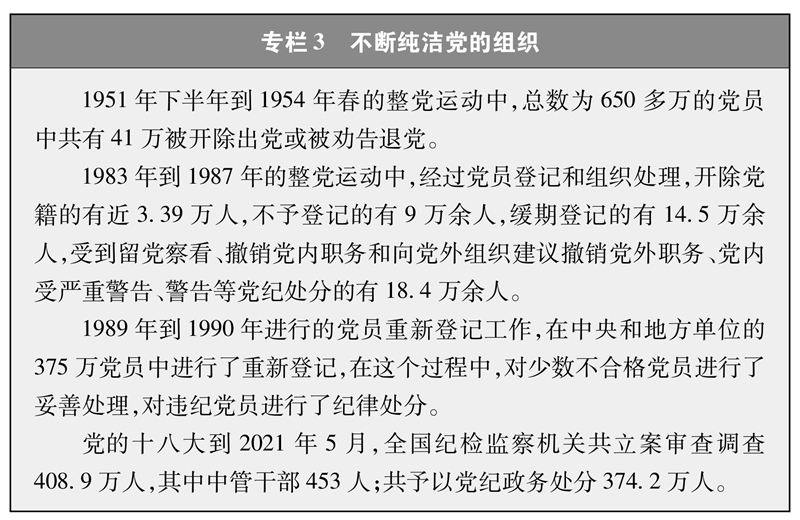
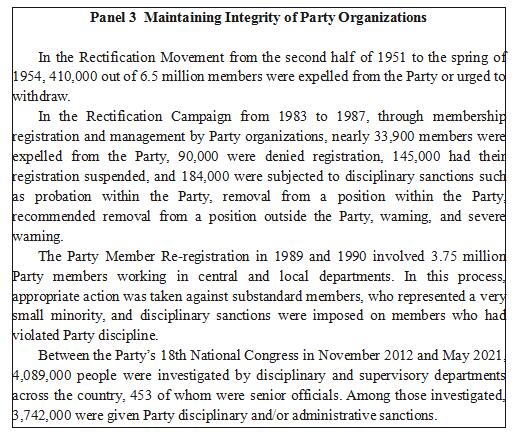
加強(qiáng)對(duì)權(quán)力的制約和監(jiān)督。中國(guó)共產(chǎn)黨的權(quán)力是人民賦予的,只能用來(lái)為人民謀利益,黨對(duì)此始終保持清醒認(rèn)識(shí)。黨創(chuàng)立伊始,就指出地方委員會(huì)的財(cái)政、活動(dòng)和政策應(yīng)受中央執(zhí)行委員會(huì)的監(jiān)督。抗日戰(zhàn)爭(zhēng)時(shí)期,黨提出只有讓人民來(lái)監(jiān)督政府,政府才不敢松懈。新中國(guó)成立后不久,黨成立了中央及地方各級(jí)紀(jì)律檢查委員會(huì),成立國(guó)家行政監(jiān)察部門,加強(qiáng)對(duì)領(lǐng)導(dǎo)干部特別是高級(jí)干部的監(jiān)督。改革開(kāi)放新時(shí)期,黨積極推進(jìn)黨和國(guó)家領(lǐng)導(dǎo)制度改革,健全完善黨委內(nèi)部的議事和決策機(jī)制,建立健全決策權(quán)、執(zhí)行權(quán)、監(jiān)督權(quán)既相互制約又相互協(xié)調(diào)的權(quán)力結(jié)構(gòu)和運(yùn)行機(jī)制。黨的十八大以來(lái),黨把加強(qiáng)對(duì)權(quán)力的制約和監(jiān)督作為全面從嚴(yán)治黨重要內(nèi)容,圍繞“把權(quán)力關(guān)進(jìn)制度的籠子里”,突出“一把手”和領(lǐng)導(dǎo)班子這個(gè)“關(guān)鍵少數(shù)”,以巡視工作條例、黨內(nèi)監(jiān)督條例等為重點(diǎn)健全黨內(nèi)監(jiān)督法規(guī)體系,鍛造巡視利劍并組織開(kāi)展大規(guī)模巡視,實(shí)現(xiàn)向中央一級(jí)黨和國(guó)家機(jī)關(guān)全面派駐紀(jì)檢機(jī)構(gòu),深化國(guó)家監(jiān)察體制改革,把黨內(nèi)監(jiān)督同國(guó)家機(jī)關(guān)監(jiān)督、民主監(jiān)督、司法監(jiān)督、群眾監(jiān)督、輿論監(jiān)督貫通起來(lái),讓權(quán)力在陽(yáng)光下運(yùn)行。
Strengthening checks and scrutiny over the exercise of power. The mandate of the CPC comes from the people and must be exercised in the interests of the people. The Party is always soberly aware of this. Upon its founding, the Party stipulated that the finances, activities and policies of local committees would be supervised by the Central Executive Committee. During the War of Resistance Against Japanese Aggression, the Party made it clear that only under public scrutiny could a government be clean and efficient. Soon after the founding of the PRC, the Party set up commissions for disciplinary inspection and the state established supervisory departments at the central and local levels to bring officials under closer scrutiny, especially those in senior positions. Since the beginning of reform and opening up, the Party has actively pressed forward with reform of the system of Party and state leadership, improving the mechanisms for deliberation and decision-making within Party committees, and establishing and improving a framework for the exercise of power under which decision-making power, executive power and supervisory power are mutually exclusive but are coordinated with each other. Since its 18th National Congress, the CPC has been strengthening checks on and scrutiny over the exercise of power as an important part of its full and strict self-discipline.
Focusing on confining the exercise of power in an institutional cage, the Party gives prominence to scrutiny of the "key few" – the principal members of the leadership teams at all levels. It is improving its regulatory system for internal oversight, the priorities being the introduction of provisions on tours of disciplinary inspection and the regulations on internal scrutiny. While strengthening the deterrent role of disciplinary inspection, the Party has launched massive inspection campaigns and dispatched resident disciplinary inspection agencies to the central-level departments of the Party and the government. It works to extend reform of the national supervision system and integrates intra-Party oversight with oversight by state organs, democratic oversight, judicial oversight, public oversight, and oversight by the media, to ensure that power is exercised under public scrutiny.
堅(jiān)決反對(duì)腐敗。腐敗問(wèn)題是關(guān)系黨的生死存亡的重大問(wèn)題。中國(guó)共產(chǎn)黨深知腐敗之害,與腐敗水火不容。黨成立之初就提出對(duì)腐化分子混入黨內(nèi)的現(xiàn)象必須高度警惕,要求堅(jiān)決清洗不良分子,和不良傾向斗爭(zhēng)。新中國(guó)成立初期,在黨政機(jī)關(guān)工作人員中開(kāi)展反對(duì)貪污、反對(duì)浪費(fèi)、反對(duì)官僚主義的“三反”運(yùn)動(dòng),特別是判處在革命戰(zhàn)爭(zhēng)中有過(guò)功勞但墮落成為大貪污犯的劉青山、張子善死刑,在全黨引起震動(dòng)。黨的十八大以來(lái),面對(duì)一段時(shí)間內(nèi)黨內(nèi)腐敗問(wèn)題比較嚴(yán)重的狀況,黨以“得罪千百人,不負(fù)十四億”的意志,以猛藥去疴、重典治亂的決心,以刮骨療毒、壯士斷腕的勇氣,堅(jiān)持反腐敗無(wú)禁區(qū)、全覆蓋、零容忍,堅(jiān)定不移“打虎”“拍蠅”“獵狐”,以雷霆之勢(shì)、霹靂手段懲治腐敗,持續(xù)形成強(qiáng)大震懾,同時(shí),堅(jiān)持系統(tǒng)施治、標(biāo)本兼治,一體推進(jìn)不敢腐、不能腐、不想腐,反腐敗斗爭(zhēng)取得壓倒性勝利并全面鞏固。在解決腐敗這個(gè)古今中外治國(guó)理政的頑疾方面,黨不僅有鮮明態(tài)度,更有實(shí)際行動(dòng)。
Resolutely combating corruption. Corruption is a major threat to the Party's survival. The CPC is fully aware of the harm that corruption can do and tolerates no corruption. At its very beginning, the Party cautioned that it must stay keenly alert to the entryism of corrupt elements, and vowed to resolutely expel bad elements and fight against negative trends. In the early years of the PRC, the Party launched the campaign against the "three evils" of corruption, waste and bureaucratism within Party and government institutions. In particular, the death penalties imposed on Liu Qingshan and Zhang Zishan, both of whom had performed with great merit in the revolutionary war but later degenerated into major embezzlers, sent a shockwave through the whole Party.
Since its 18th National Congress, facing a situation where corruption had been a growing problem in the Party for some time, the CPC has demonstrated its commitment to resolute action. It would rather offend a few thousand corrupt officials than fail to live up to the expectations of 1.4 billion Chinese people. It has remained firm in its determination and demonstrated great courage in combating corruption. Just as heavy doses of medicine are needed to treat serious disease, stringent measures must be applied to address serious corruption. To this end, the Party has allowed no safe haven, left no ground unturned, and shown no tolerance in fighting corruption. It has taken firm action to "take out tigers", "swat flies", and "hunt down foxes". [ Tigers and flies respectively refer to high-ranking and petty officials guilty of corruption, while foxes refer to corrupt officials who have fled abroad. – Tr.] To form a powerful deterrent it has punished corruption with decisive measures and overwhelming severity. At the same time it has taken a systemic approach to addressing both the symptoms and root causes of corruption, ensuring that officials do not dare to be, are denied the opportunity to be, and have no wish to be corrupt. As a result, a crushing victory has been won in the anti-corruption campaign and the success has been consolidated. In resolving the issue of corruption, a persistent problem in governance at all times and across the globe, the Party has adopted an uncompromising attitude and taken concrete actions.
堅(jiān)決防止在黨內(nèi)形成特權(quán)階層。中國(guó)共產(chǎn)黨深刻汲取古今中外治黨不嚴(yán)、治國(guó)不力的深刻教訓(xùn),刀刃向內(nèi),從嚴(yán)治黨,從黨中央嚴(yán)起、從黨的高級(jí)干部嚴(yán)起,嚴(yán)下先嚴(yán)上、嚴(yán)人先嚴(yán)己。革命戰(zhàn)爭(zhēng)年代,從黨的領(lǐng)袖、黨的領(lǐng)導(dǎo)人到各級(jí)領(lǐng)導(dǎo)干部,與普通士兵和廣大群眾同甘共苦,形成了無(wú)堅(jiān)不摧的戰(zhàn)斗力。新中國(guó)成立后,黨采取有力措施加強(qiáng)對(duì)黨的高級(jí)干部的監(jiān)督。改革開(kāi)放初期,黨對(duì)高級(jí)干部生活待遇作出若干規(guī)定,強(qiáng)調(diào)高級(jí)干部必須帶頭發(fā)揚(yáng)黨的優(yōu)良傳統(tǒng)。黨的十八大以來(lái),黨中央以身作則、以上率下,嚴(yán)格執(zhí)行中央八項(xiàng)規(guī)定?,并把反“四風(fēng)”?、反腐敗與反特權(quán)思想和特權(quán)現(xiàn)象相結(jié)合,在干部辦公用房、公務(wù)用車、秘書(shū)配備、公務(wù)消費(fèi)等方面出臺(tái)了一系列整治措施,嚴(yán)格規(guī)范領(lǐng)導(dǎo)干部特別是高級(jí)領(lǐng)導(dǎo)干部的工作和生活待遇,帶動(dòng)了全黨全社會(huì)風(fēng)氣整體轉(zhuǎn)變,凝聚了黨心民心,提升了黨在人民心中的形象和威信。
Preventing the formation of an entitled elite in the Party. The CPC has drawn profound lessons from examples of failure or ineffective leadership of political parties or states throughout history and across the world. It is always strict with itself, with its Central Committee, and with its senior officials. In the years of revolutionary war, the Party's top leaders and other officials at all levels stood together with the rank and file through thick and thin, forming an invincible force. After the founding of the PRC, the Party adopted rigorous measures to bring senior officials under closer scrutiny. In the early years of reform and opening up, it set out provisions delimiting the legitimate privileges of senior officials, and emphasizing that they must take the lead in carrying forward the Party's fine traditions. Since the 18th CPC National Congress, the Central Committee has played a model role in strictly observing its Eight Rules [ The Eight Rules were set by the Political Bureau of the 18th CPC Central Committee to urge all officials to improve their ways of doing things and maintain close ties with the people. They are summarized as follows: improving investigation and fact-finding trips, streamlining meetings and other activities, reducing documents and briefings, standardizing arrangements for visits abroad, improving security procedures, improving news reports, imposing restrictions on publishing writings, and practicing diligence and frugality.]. It opposes corruption and the Four Malfeasances [ The Four Malfeasances refer to the practices of favoring form over substance, bureaucratism, hedonism, and extravagance.], as well as any sense of entitlement and the inclination to act on it. It has issued a series of rectifying measures on the assignment of offices, official vehicles, and immediate staff, and on spending in the performance of official duties, with the goal of strictly delimiting the privileges of officials, especially senior officials. All of this has led to a complete change in the whole ethos of the Party and society. As a result, the Party has boosted the faith of its members and the people, and enhanced its image and authority in their hearts.
(四)注重學(xué)習(xí)總結(jié)
4. Promoting Study and Review
中國(guó)共產(chǎn)黨是有本事的黨。100年來(lái),黨領(lǐng)導(dǎo)人民創(chuàng)造了以少勝多、以弱勝?gòu)?qiáng)的戰(zhàn)爭(zhēng)奇跡,創(chuàng)造了經(jīng)濟(jì)快速發(fā)展奇跡和社會(huì)長(zhǎng)期穩(wěn)定奇跡,一次次讓不可能成為可能。黨之所以能夠站在時(shí)代潮頭、引領(lǐng)風(fēng)氣之先,能夠應(yīng)對(duì)復(fù)雜形勢(shì)、完成艱巨任務(wù),一個(gè)關(guān)鍵因素在于黨注重學(xué)習(xí)總結(jié)和吸收借鑒,不斷增強(qiáng)進(jìn)行革命、建設(shè)、改革所需要的實(shí)際本領(lǐng)。
The CPC is a capable party. Over the past hundred years, it has led the people to numerous great achievements: defeating the many and strong with the few and weak in war, maintaining rapid economic growth and lasting social stability, and turning the impossible into the possible again and again. The reasons that the Party has been able to stand in the forefront of the times, respond to complex circumstances, and complete arduous tasks, are twofold. One is its emphasis on study and review; the other its commitment to drawing on good experience from other countries to strengthen its own capability for revolution, reconstruction and reform.
中國(guó)共產(chǎn)黨是學(xué)習(xí)型政黨。黨的性質(zhì)和擔(dān)負(fù)的使命,要求黨必須注重學(xué)習(xí)、善于學(xué)習(xí)、不斷學(xué)習(xí)。面對(duì)不斷發(fā)展變化的形勢(shì)任務(wù),黨始終甘當(dāng)小學(xué)生,向群眾學(xué)、向?qū)嵺`學(xué)、向歷史學(xué)、向別人學(xué)。革命戰(zhàn)爭(zhēng)年代,黨靠著學(xué)習(xí),找到了中國(guó)革命的正確道路。新中國(guó)成立初期,黨靠著學(xué)習(xí),迅速恢復(fù)國(guó)民經(jīng)濟(jì),使國(guó)內(nèi)外那些懷疑共產(chǎn)黨能夠搞好經(jīng)濟(jì)的人們也不能不表示贊佩。改革開(kāi)放后,黨靠著學(xué)習(xí),探索出中國(guó)特色社會(huì)主義道路。進(jìn)入新時(shí)代,面對(duì)現(xiàn)代信息技術(shù)的迅猛發(fā)展和復(fù)雜的國(guó)內(nèi)外環(huán)境,黨提出建設(shè)學(xué)習(xí)型、服務(wù)型、創(chuàng)新型馬克思主義執(zhí)政黨的重大任務(wù),在全黨大興學(xué)習(xí)之風(fēng),執(zhí)政能力和執(zhí)政水平顯著提升。黨重視抓好領(lǐng)導(dǎo)干部特別是高級(jí)領(lǐng)導(dǎo)干部的學(xué)習(xí),培養(yǎng)了一支治黨治國(guó)治軍的中堅(jiān)力量。中共中央政治局建立集體學(xué)習(xí)制度?,為全黨起到了重要的帶頭示范作用。建立黨委(黨組)理論學(xué)習(xí)中心組學(xué)習(xí)制度,各級(jí)黨委(黨組)領(lǐng)導(dǎo)班子成員定期圍繞不同主題進(jìn)行學(xué)習(xí)。在全黨定期或不定期開(kāi)展形勢(shì)政策教育。依托中央和地方各級(jí)黨校(行政學(xué)院),開(kāi)展大規(guī)模多層次培訓(xùn)。重視學(xué)習(xí)、善于學(xué)習(xí),使得黨能夠適應(yīng)不斷發(fā)展變化的形勢(shì),樹(shù)立新觀念,掌握新本領(lǐng),解決新問(wèn)題。黨依靠學(xué)習(xí)贏得過(guò)去,也將依靠學(xué)習(xí)贏得未來(lái)。
The CPC is a learning party. Its nature and mission require it to devote attention to learning, be adept at learning, and continue to learn. Facing developments and changes in its circumstances and tasks, the Party has always been modest, learning from the people, from experience, from history and from other countries.
In the years of revolutionary war, it was by learning that the Party found the correct path for the Chinese revolution. After the founding of the PRC, it was by learning that the CPC was able to quickly restore the economy, winning praise and respect from those doubting its ability. After the launch of reform and opening up, it was by learning that the Party opened up the path of socialism with Chinese characteristics. In the new era of surging modern information technology and a complex domestic and international landscape, the Party has set a major task – to develop itself into a learning, service-oriented, and innovative Marxist governing party, launching campaigns to encourage learning within the Party to strengthen its ability in governance.
The CPC gives priority to learning by officials, particularly those in leading positions, through which it has cultivated a strong contingent of individuals capable of leading the Party, governing the country, and commanding the military. The Political Bureau of the CPC Central Committee has a system of regular group study sessions [ Under this system, the general secretary presides over each session and delivers a speech, and all members of the Political Bureau attend the session. Experts and academics are invited to give lectures on issues relating to the economy, politics, history, culture, society, science and technology, military affairs, foreign relations, and other subjects. The Political Bureau of the 18th CPC Central Committee held 43 group study sessions. By July 30, 2021, the Political Bureau of the 19th CPC Central Committee had held 32 group study sessions.], playing an exemplary and leading role for the whole Party. There is also a system of study groups for leading officials, under which Party committees and Party leadership groups at all levels hold study sessions on different topics on a regular basis. Various activities are organized to educate Party members on the current situation and the Party's targeted policies. Training on a large scale and at multiple levels is conducted by central and local Party schools or schools of governance. This requirement for learning and being able to learn has enabled the Party to adapt to changing circumstances, foster new ideas, acquire new skills and solve new problems. It is through learning that the Party has succeeded in the past, and it is through learning that it will succeed in the future.
中國(guó)共產(chǎn)黨是靠總結(jié)經(jīng)驗(yàn)成長(zhǎng)起來(lái)的。不論是革命戰(zhàn)爭(zhēng)年代還是和平建設(shè)時(shí)期,從黨中央到基層組織,完成階段性工作和重大任務(wù)后,都要進(jìn)行總結(jié),發(fā)揚(yáng)優(yōu)點(diǎn),克服缺點(diǎn),繼續(xù)前進(jìn),做到打一仗進(jìn)一步。勤于總結(jié)、善于總結(jié),已經(jīng)成為黨重要的思想方法和工作方法。黨既重視總結(jié)成功經(jīng)驗(yàn),更重視從失敗中學(xué)習(xí)。自己犯的錯(cuò)誤特別是大錯(cuò)誤,暴露出的問(wèn)題、揭示出的規(guī)律往往更加深刻,更值得總結(jié)。歷史上,黨每次都能從大的錯(cuò)誤中總結(jié)教訓(xùn),使黨的事業(yè)有一個(gè)大的推進(jìn)。黨在探索、總結(jié)、提高的螺旋式上升中,實(shí)現(xiàn)了重要經(jīng)驗(yàn)的提煉升華,實(shí)現(xiàn)了具有重要意義的歷史轉(zhuǎn)折。當(dāng)代中國(guó)是歷史中國(guó)的延續(xù)和發(fā)展。黨高度重視歷史的學(xué)習(xí),反復(fù)強(qiáng)調(diào)學(xué)習(xí)中國(guó)歷史,學(xué)習(xí)黨史、新中國(guó)史、改革開(kāi)放史、社會(huì)主義發(fā)展史,在汲取歷史經(jīng)驗(yàn)中不斷前進(jìn)。黨以史為鑒,既注重從中華優(yōu)秀傳統(tǒng)文化中汲取治國(guó)理政的智慧和營(yíng)養(yǎng),也深刻汲取歷代政權(quán)更迭和各種政治力量衰敗的教訓(xùn),反復(fù)警醒全黨,避免重蹈覆轍。黨不僅注重總結(jié)汲取自身和本國(guó)歷史的經(jīng)驗(yàn),還注重總結(jié)汲取世界政黨特別是世界社會(huì)主義運(yùn)動(dòng)的經(jīng)驗(yàn)教訓(xùn),以其為鏡鑒,反思和改進(jìn)黨的工作,不斷提高執(zhí)政能力和拒腐防變能力。
The CPC has grown strong by reviewing experience and summarizing the lessons learned. Whether in times of war or peace, Party organizations, from the top-level Central Committee to the grassroots, produce a review after completing a project or major task, so that they can identify successes, remedy shortcomings, and move forward. Being diligent in and adept at reviewing experience has become an important part of the Party's theoretical and practical work. In addition to summing up successful experience, the CPC attaches great importance to drawing lessons from and learning from failures. Problems and mistakes – particularly serious ones – and the requirements revealed by such mistakes and problems are often worth summarizing. Throughout its history, the CPC has been able to draw lessons from every major error, in order to advance its cause. From this progressive spiral of review, summary, and action the CPC has extracted important experience, and gone on to make changes of historic significance.
Contemporary China is the extension and development of China in the past. The CPC pays close attention to learning from history and constantly emphasizes the significance of such learning. By studying its own history and the history of China, including the PRC, reform and opening up, and the development of socialism, the Party has been able to move forward based on historical experience. To learn from history the CPC draws on wisdom and nutrients from the best of traditional Chinese culture, and at the same time learns lessons from the rise and fall of previous regimes or political powers. It reminds the whole Party not to commit the same errors. The CPC also sums up experience and lessons from other political parties around the world and from the world socialist movement, to reflect on and improve its work, reinforce its ability to govern the country, and combat corruption.
中國(guó)共產(chǎn)黨是開(kāi)明開(kāi)放的政黨。對(duì)于人類文明的一切優(yōu)秀成果,黨從來(lái)都是結(jié)合實(shí)際,以開(kāi)放態(tài)度積極吸收借鑒。新中國(guó)成立后,黨借鑒蘇聯(lián)經(jīng)驗(yàn)開(kāi)展社會(huì)主義革命和建設(shè),對(duì)于恢復(fù)和發(fā)展國(guó)民經(jīng)濟(jì),推動(dòng)社會(huì)主義改造和工業(yè)化發(fā)展,發(fā)揮了重要作用。改革開(kāi)放后,黨積極吸收和借鑒世界各國(guó)包括發(fā)達(dá)資本主義國(guó)家的一切反映現(xiàn)代社會(huì)化生產(chǎn)規(guī)律的先進(jìn)經(jīng)營(yíng)方式、管理方法和科學(xué)技術(shù),顯著提升了中國(guó)的現(xiàn)代化建設(shè)水平。黨的十八大以來(lái),黨積極推動(dòng)文明交流互鑒,深化與其他政黨治國(guó)理政經(jīng)驗(yàn)交流,加強(qiáng)多種形式、多種層次的國(guó)際政黨交流合作,通過(guò)政黨間協(xié)商合作促進(jìn)國(guó)家間協(xié)調(diào)合作,推動(dòng)共同發(fā)展,實(shí)現(xiàn)互利共贏。
The CPC is an open-minded party. Proceeding from China's realities, the Party absorbs and draws on all the excellent achievements of human civilization. After the founding of the PRC, it learned from the Soviet Union how to carry out socialist revolution and how to build socialism, which helped it to restore and develop the economy and advance socialist transformation and industrialization.
After the launch of reform and opening up, it drew on advanced operating models, managerial experience, and technologies that embody the laws of modern socialized production. What the Party learned from the rest of the world, including developed capitalist countries, helped advance China's modernization.
Since its 18th National Congress, the CPC has promoted exchanges and mutual learning between civilizations, expanded the sharing of experience with political parties from other countries, and strengthened communication and cooperation in many forms and at multiple levels with political parties around the world. Through consultation and cooperation with other political parties, the CPC has strengthened China's ties with other countries in pursuit of common development and mutual benefit.
100年來(lái),中國(guó)共產(chǎn)黨歷經(jīng)千錘百煉而朝氣蓬勃,一個(gè)很重要的原因就是勇于自我革命。未來(lái)路上,黨仍然面臨著精神懈怠危險(xiǎn)、能力不足危險(xiǎn)、脫離群眾危險(xiǎn)、消極腐敗危險(xiǎn),仍然面臨著執(zhí)政考驗(yàn)、改革開(kāi)放考驗(yàn)、市場(chǎng)經(jīng)濟(jì)考驗(yàn)、外部環(huán)境考驗(yàn)。但是,經(jīng)過(guò)百年磨礪,黨具有自我革命的勇氣和能力,能夠經(jīng)受住各種挑戰(zhàn)和考驗(yàn),不變質(zhì)、不變色、不變味,始終保持旺盛生機(jī)和活力。
Over the past hundred years, the CPC has remained robust and vibrant despite having undergone so many trials and tribulations. An important reason for this is that it has had the courage to carry out self-reform. On the way ahead, the Party will still face dangers – loss of drive, incompetence, disengagement from the people, inaction, or corruption. And it will still be confronted with tests of its capacity to exercise governance of the country, carry out reform and opening up, develop the market economy, and respond to external volatility.However, after a hundred years of hard struggle, the CPC has the courage and ability to carry out self-reform and is able to meet any challenge and withstand any test. It will never change or betray its nature. It will always remain dynamic and grow stronger.









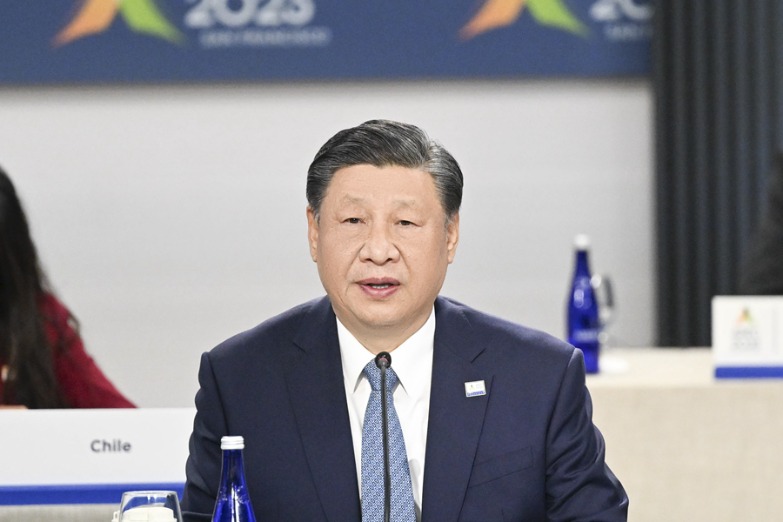
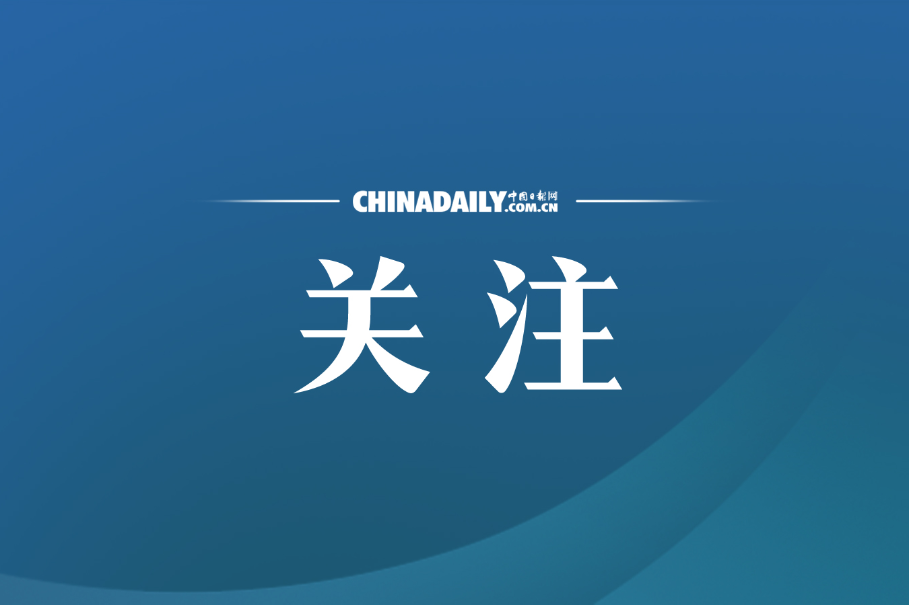
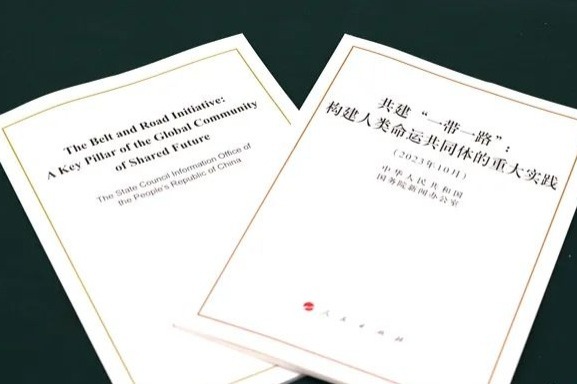
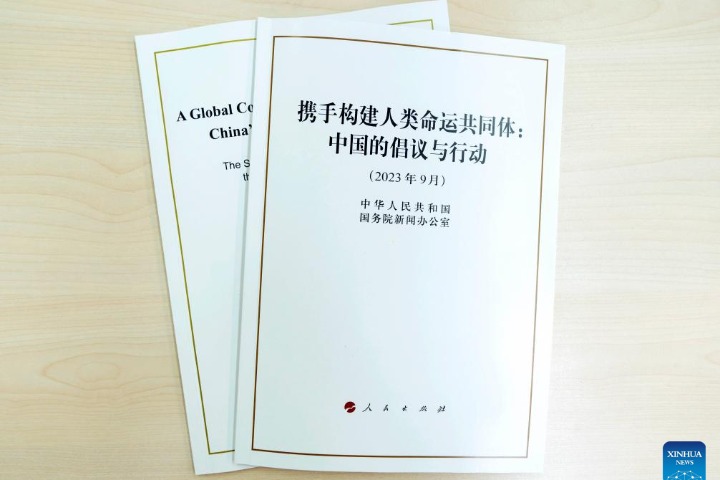
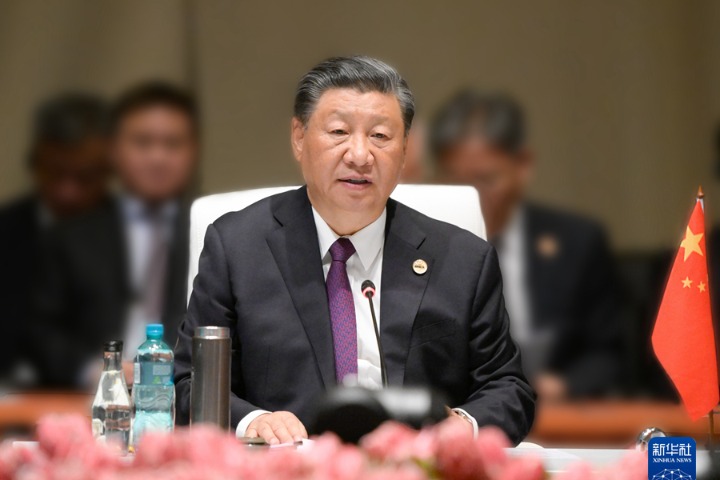



 英語(yǔ)點(diǎn)津微信
英語(yǔ)點(diǎn)津微信 雙語(yǔ)小程序
雙語(yǔ)小程序